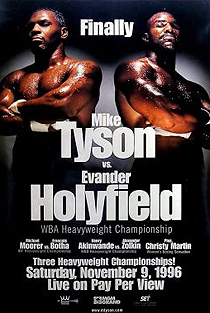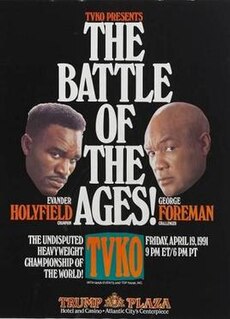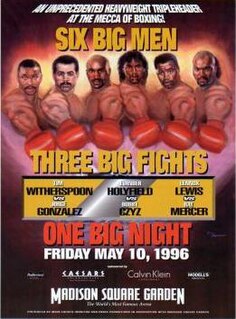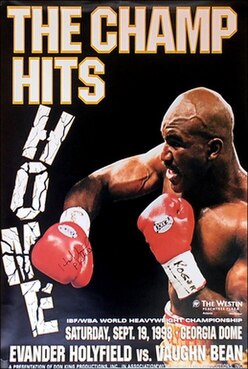A boxing judge is responsible for judging the results of a boxing match, with as many as three judges typically present at ringside to score the bout and assign points to the boxers, based on punches that connect, defense, knockdowns, and other, more subjective, measures. At the Olympic or World championship level, there are usually five judges.

Boxing is a combat sport in which two people, usually wearing protective gloves, throw punches at each other for a predetermined amount of time in a boxing ring.

Boxing has been contested at every Summer Olympic Games since its introduction to the program at the 1904 Summer Olympics, except for the 1912 Summer Olympics in Stockholm, because Swedish law banned the sport at the time. The 2008 Summer Olympics were the final games with boxing as a male only event. Since the 2012 Summer Olympics, women's boxing is part of the program.
A boxing match that has not ended in a knockout, technical knockout (TKO) or disqualification (DQ), having reached the limit on the preset number of rounds has "gone the distance" and the fighter with the higher score at the end of the fight is ruled the winner. With three judges, unanimous decisions and split decisions are possible, as are draws. Because of the open-ended style of boxing judging, fights may end with controversial results, in which one of the fighters may believe they have been "robbed" or unfairly denied a victory. A draw will result if all three judges call the fight even or if one judge favors one fighter, a second judge's card supports the other and the third calls the fight a draw. The March 1999 heavyweight unification bout between Evander Holyfield and Lennox Lewis at Madison Square Garden is an example of a draw where all three judges had scored the fight differently, with Eugenia Williams favoring Holyfield, Stanley Christodoulou favoring Lewis and Larry O'Connell calling the fight a draw. The result led to calls for an immediate rematch between the two fighters. [1] The extremely rare majority draw results when two out of the three judges call the fight even, which means the fight will be called a draw regardless if the third judge favors one fighter. There are some scoring systems used in boxing that make it impossible for a judge to award equal points for a match. If a championship bout ends in a draw, the champion usually retains the title.
A knockout is a fight-ending, winning criterion in several full-contact combat sports, such as boxing, kickboxing, muay thai, mixed martial arts, karate, some forms of taekwondo and other sports involving striking, as well as fighting-based video games. A full knockout is considered any legal strike or combination thereof that renders an opponent unable to continue fighting.
A disqualification is a term used when a bout is stopped short of knockout or judges' decision because, intentionally, one or both contestants have repeatedly or flagrantly fouled an opponent or violated other rules. The disqualified boxer automatically loses the bout to the opponent. If both are disqualified, the result is usually declared a no contest regardless of round.
A unanimous decision (UD) is a winning criterion in several full-contact combat sports, such as boxing, kickboxing, Muay Thai, mixed martial arts and other sports involving striking in which all three judges agree on which fighter won the match.
Boxing had always traditionally been a sport for males, with men performing the officiating. The first female boxing judge, Carol Polis, was appointed in 1973. [2] Eva Shain, appointed as a judge a year after Polis by the New York State Athletic Commission, became the first woman to judge a heavyweight title fight, when she was one of three judges officiating as Earnie Shavers fought Muhammad Ali at Madison Square Garden on September 29, 1977. [3]
Eva Shain was an American boxing judge who was one of the first female judges in New York and became the first woman to judge a heavyweight championship bout when she was one of the judges at the 1977 fight between Muhammad Ali and Earnie Shavers in 1977 at Madison Square Garden.
The New York State Athletic Commission or NYSAC, also known as the New York Athletic Commission, is a division of the New York State Department of State which regulates all contests and exhibitions of unarmed combat within the state of New York, including licensure and supervision of promoters, boxers, professional wrestlers, seconds, ring officials, managers, and matchmakers. In 2016, the NYSAC was authorized to oversee all mixed martial arts contests in New York.

Earnie Dee Shaver, best known as Earnie Shavers, is an American former professional boxer who competed from 1969 to 1983, with two further comebacks in 1987 and 1995. A two-time world heavyweight championship challenger, Shavers is considered by many boxing experts to be the hardest-punching boxer of all time; he scored 68 overall knockout wins, and finished 23 opponents inside the first round. His knockout-to-win ratio stands at 91.8%














